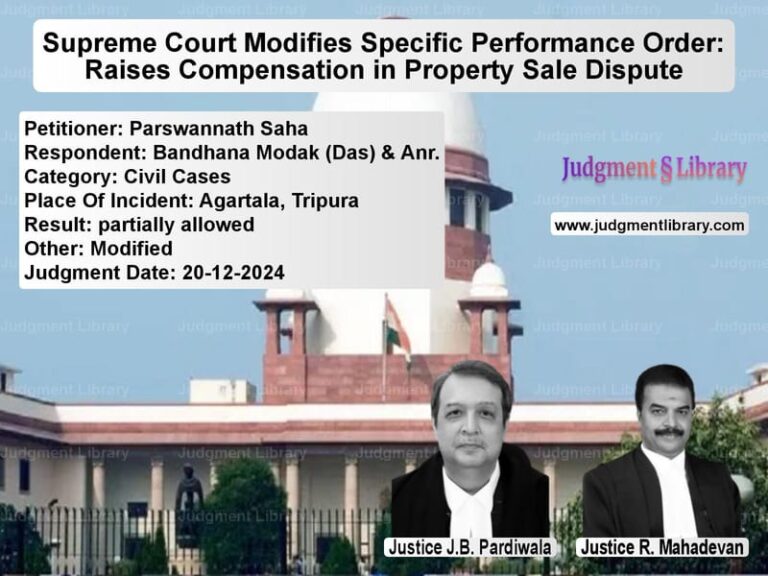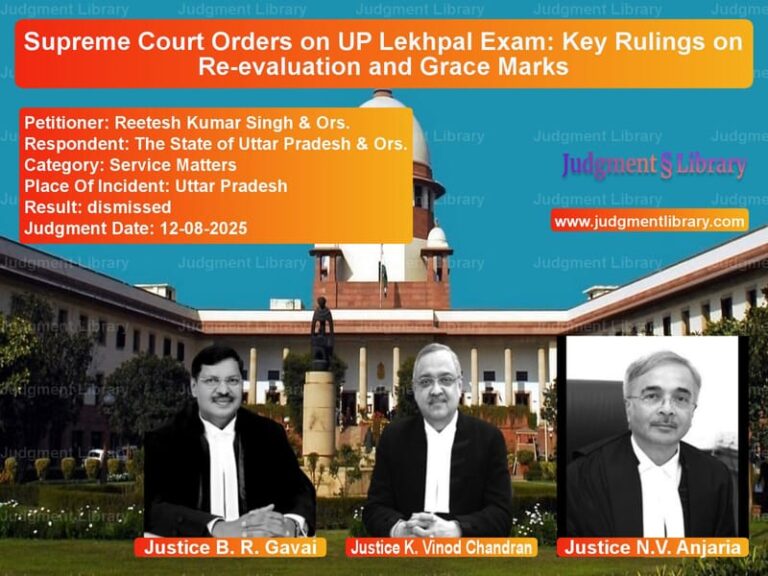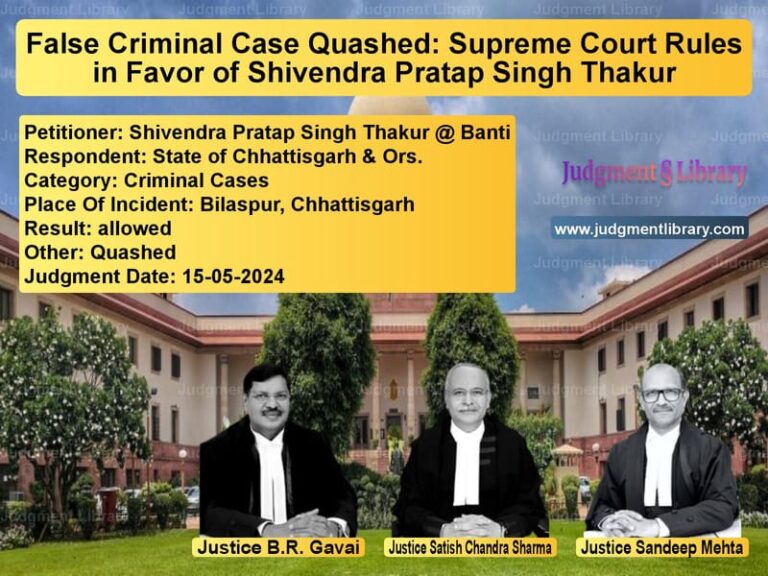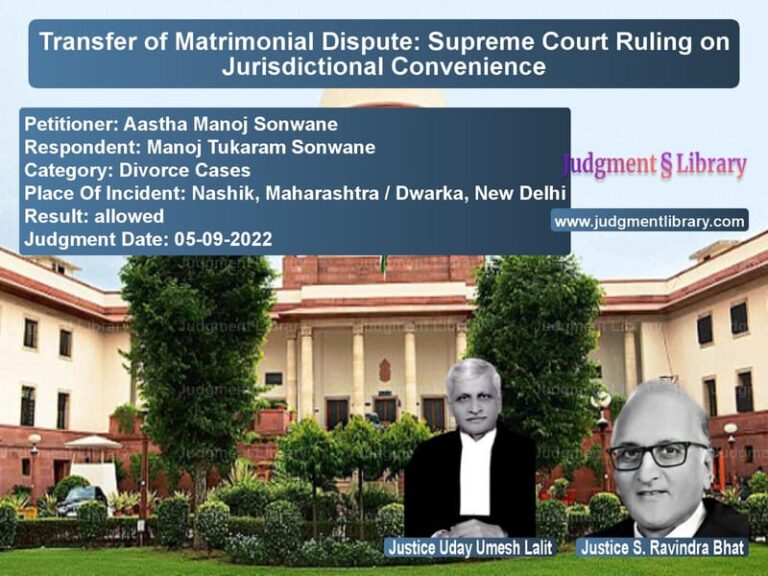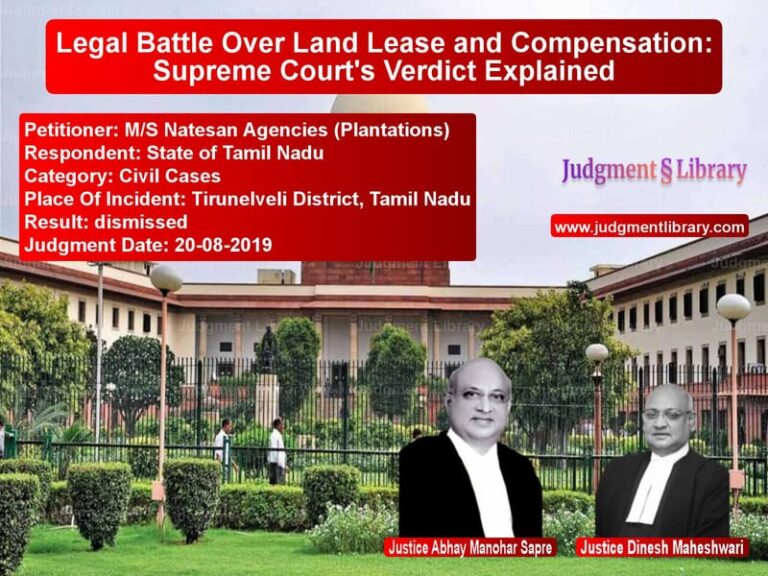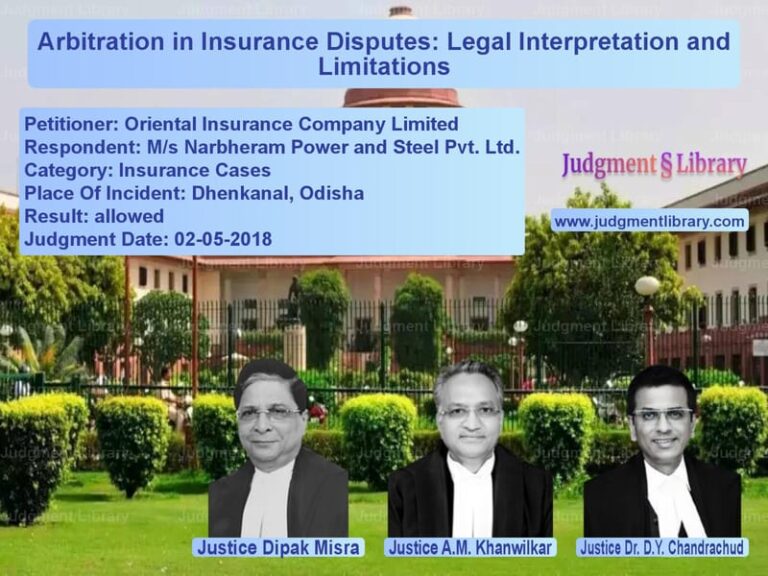M.K. Utthan Sudhar Samiti vs. Babulal Shukla: Supreme Court Upholds Right to Fair Hearing in Civil Revision Petition
The Supreme Court of India, in its judgment dated April 18, 2016, delivered a significant ruling in the case of M.K. Utthan Sudhar Samiti Maryadit & Another vs. Babulal Shukla & Others. The case revolved around the issue of intervention in an ongoing civil revision petition before the High Court. The apex court ruled in favor of the appellants and allowed their intervention, reinforcing the importance of procedural fairness and natural justice in civil litigation.
Background of the Case
The primary dispute in this case was whether the appellant, M.K. Utthan Sudhar Samiti Maryadit, should be allowed to intervene in Civil Revision Petition No. 414 of 2004, which was pending before the High Court. Initially, the High Court had issued a notice indicating that the appellant would be heard at the time of disposal of the petition. However, in its final order, the High Court rejected the intervention application, leading the appellant to seek relief from the Supreme Court.
The appellants argued that they had a legitimate interest in the matter and should be allowed to participate in the proceedings. The rejection of their intervention application was viewed as a denial of natural justice, as they were initially promised an opportunity to be heard. The Supreme Court was called upon to decide whether the High Court had erred in its decision and whether intervention should be permitted in such civil matters.
Legal Issues Raised
The central issue before the Supreme Court was whether the High Court was justified in rejecting the intervention application after initially indicating that the appellant would be heard. The case raised important questions regarding the principles of natural justice and the rights of interested parties to be heard in judicial proceedings.
Arguments by the Petitioner (Appellant)
The counsel for the appellant presented the following arguments:
- Violation of Natural Justice: The High Court had initially assured the appellant that they would be heard at the time of disposal of the Civil Revision Petition. However, this assurance was not honored when the intervention application was later rejected.
- Legitimate Interest in the Case: The appellant had a valid legal interest in the outcome of the Civil Revision Petition and should have been granted the opportunity to participate in the proceedings.
- Unjustified Reversal of High Court’s Own Decision: The High Court’s decision to reject the intervention application was inconsistent with its earlier stance, creating an element of procedural unfairness.
- Need for Fair Hearing: The appellant contended that intervention was necessary to ensure a fair hearing, as their interests would be directly affected by the outcome of the Civil Revision Petition.
Arguments by the Respondent
The respondents opposed the intervention application on the following grounds:
- No Direct Legal Interest: The respondents argued that the appellant did not have a direct legal stake in the case and that their intervention was unnecessary for the adjudication of the Civil Revision Petition.
- High Court’s Discretion: The respondents contended that the High Court had the authority to decide whether an intervenor should be allowed to participate in the proceedings and that its decision should not be interfered with.
- Delay in Proceedings: Allowing intervention at this stage would unnecessarily prolong the litigation and delay the resolution of the case.
Supreme Court’s Observations
The Supreme Court, after hearing both sides, observed that the rejection of the intervention application was unjustified. The court emphasized that the principles of natural justice require that all interested parties be given an opportunity to be heard. The court stated:
“In the interest of justice, the intervention application of the appellant should be allowed, and the appellant should also be permitted to participate in the proceedings.”
The court further noted that the High Court had initially taken a different view while issuing the notice and had assured the appellant that they would be heard. The subsequent rejection of the intervention application was inconsistent with this earlier assurance and amounted to a denial of natural justice.
Supreme Court’s Ruling
The Supreme Court ruled in favor of the appellant and allowed their intervention in the pending Civil Revision Petition. The key points of the ruling were:
- The appellant shall be permitted to participate in Civil Revision Petition No. 414 of 2004 pending before the High Court.
- The High Court was requested to expedite the disposal of the petition to avoid unnecessary delays in litigation.
- The appeal was disposed of with no order as to costs.
Analysis of the Judgment
The ruling in M.K. Utthan Sudhar Samiti vs. Babulal Shukla is significant for several reasons:
- Reaffirmation of Natural Justice: The judgment reinforces the principle that courts must ensure fair hearings and uphold the rights of interested parties in judicial proceedings.
- Consistency in Judicial Decisions: The Supreme Court highlighted the importance of consistency in judicial decisions, noting that the High Court had initially assured the appellant of a hearing but later denied it.
- Fair Participation in Legal Proceedings: The ruling ensures that intervention applications are not arbitrarily rejected and that all stakeholders with a legitimate interest are given an opportunity to present their case.
Implications of the Judgment
The Supreme Court’s ruling has significant implications for future cases involving intervention applications in civil proceedings:
- Guidance for High Courts: High Courts must exercise caution while dealing with intervention applications and ensure that procedural fairness is upheld.
- Precedent for Future Cases: The judgment serves as a precedent for similar cases, establishing that intervention should be allowed when a party has a legitimate interest in the outcome.
- Stronger Legal Framework for Intervenors: The decision strengthens the legal position of intervenors and reinforces their right to be heard in matters where their interests are at stake.
Conclusion
The Supreme Court’s judgment in M.K. Utthan Sudhar Samiti vs. Babulal Shukla is a landmark ruling that upholds the principles of natural justice and procedural fairness. By allowing the appellant to intervene in the Civil Revision Petition, the court has reinforced the importance of ensuring that all interested parties are given a fair opportunity to present their case. The judgment sets a crucial precedent for future cases involving intervention applications and strengthens the legal framework for participatory justice in civil litigation.
Don’t miss out on the full details! Download the complete judgment in PDF format below and gain valuable insights instantly!
Download Judgment: M.K. Utthan Sudhar S vs Babulal Shukla & Oth Supreme Court of India Judgment Dated 18-04-2016-1741854660518.pdf
Direct Downlaod Judgment: Direct downlaod this Judgment
See all petitions in Contract Disputes
See all petitions in Property Disputes
See all petitions in Specific Performance
See all petitions in Judgment by Kurian Joseph
See all petitions in Judgment by R. Banumathi
See all petitions in allowed
See all petitions in supreme court of India judgments April 2016
See all petitions in 2016 judgments
See all posts in Civil Cases Category
See all allowed petitions in Civil Cases Category
See all Dismissed petitions in Civil Cases Category
See all partially allowed petitions in Civil Cases Category


